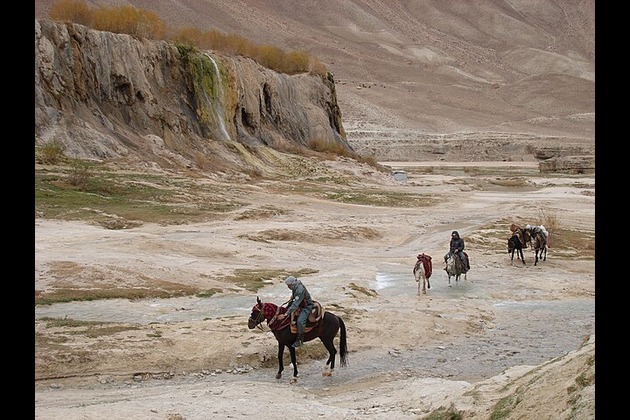The 12-Day War and the World Conflict
Pressenza
02 Jul 2025, 00:52 GMT+10

The war against Iran, which Israel has been seeking for over 20 years and which it launched with a blatant aggression on June 13, ended on June 24. A surprise attack ended with a surprise ceasefire. It is only a truce because the project of US-Israeli hegemony in West Asia (the Middle East) remains. Defeating Iran in order to achieve this hegemony is still on the agenda because the independence of a country of 90 million people constitutes a major obstacle. At the same time, the conquest of Iran would be a significant blow by the United States against its Russian and Chinese adversaries, and therefore a significant gain in a world war that has yet to be named.
The origins of the war between Israel and Iran
Israeli ambition, embodied by Netanyahu and the fanatic and warmongers around him, is to dominate West Asia through brute force. Placing 400 million Muslims under the thumb of 7 million Jews is a contemporary application of settler-colonialism, whereby a minority of "whites" subjugates a population of " natives." To this end, all "native" resistance must be eliminated. For more than 20 years, since the time of Bush II, the United States has tried to build, under its aegis, an anti-Iranian coalition composed of Israel and subservient Arab countries. This was the objective of the " Abraham" Accords, which it promoted on the eve of the Palestinian operation of October 7, 2023. This operation brought it to a halt. Israel saw this as an opportunity to launch wars against all its neighbors, with the political backing, funding, and weapons of Western countries. Their support was assured because, in the face of real-time atrocities, ethnic cleansing, and genocide in Palestine, they showed solidarity with Israel, the only country in the world to which all crimes are permitted.
Israel's most ardent desire was to draw the United States into a war against Iran, to the great benefit of Israel and its regional ambitions. Several factors made this dream possible. Trump's reelection, beholden to his Zionist backers (heiress Myriam Adelson contributed $100 million to his election campaign) and supported by Christian Zionist evangelicals with an eschatological vision, must be mentioned. Added to this, however, was the funding of members of the Senate and of the House of Representatives, as well as Zionist penetration into the highest echelons of government and the permeation of mainstream media. By taking the money, Trump made pledges which put him between a rock and a hard place because his electorate demanded an end to the endless wars in the Middle East quagmire ("a peace president"), while Israel demanded direct US military intervention on its side.
Just as the lie about weapons of mass destruction was the pretext for attacking Iraq in 2003, Iran's nuclear program has served for over 20 years as a cover to threaten that country. In both cases, the goal is geopolitical, namely to bring down two countries guilty of being independent, using scarecrows and smokescreens to mislead the general public. The 2015 agreement settled the dispute by allowing uranium enrichment to 3.67%, enough for civilian use and far from the 90% required for military use. But this did not suit Israel, and Trump tore up the agreement in 2018. Western "sanctions" still weighed on the Iranian economy. Iran then enriched to 60% to give itself leverage for future negotiations aimed at removing these "sanctions."
Looking back on the June 2025 war
These negotiations were underway, and a session was scheduled for June 15, when, with assumed and normalized perfidy, Israel attacked Iran on June 13, with the participation of the United States (planning, satellite intelligence, in-flight refueling). American soldiers activated THAAD anti-aircraft defense batteries in Israel. As for Western leaders, they justified the aggression by reciting the worn out "Israel has the right to defend itself." More candidly, Chancellor Merz said that " Israel does the dirty work for us." All this on the eve of a UN conference to revive the option of a Palestinian state.
The Pearl Harbor or Barbarossa-style surprise attack was supposed to stun Iran, demoralize it, sow chaos, and cause state collapse. Netanyahu made no secret of his hope of " Libyanizing " Iran. The assassination of high-ranking military officers and scientists ("beheading") combined common crime with war. Assassinating opponents has long been a common Israeli practice. It has always been part of the typical delusions of colonizers who want to believe that the movements resisting them are not genuine and depend only on a few individuals. Yet neither the PLO, nor Hamas, nor Hezbollah, nor the Iranian Revolutionary Guards disbanded due to the death of their leaders. They simply replaced them. Iran is doing the same thing on June 13, 2025.
The fate of the 12-day war was decided in the first 24 hours because Iran did not collapse. Its response began in the evening with a volley of missiles. And the missiles continued to rain down for 12 days, the salvos becoming stronger and stronger. Iranian stockpiles were considerable and varied. The shots were accurate, and significant damage was caused to strategic installations. Israel was greatly surprised. Like Russia in 2022, Iran was supposed to be weak. For the first time in its history, Israel was experiencing war at home; it was accustomed to waging war with impunity on other countries' soil and benefiting from the attacker's privilege and better weapons. The air defense system, touted as the best in the world, turned out to be nothing more than a sieve, even for older missiles. It was easily penetrated by clustered Iranian projectiles, increasingly modern and high-speed due to their hypersonic nature. The interception rate was low and the stockpile of interceptor missiles was rapidly diminishing.
Clearly, Israel's initial assumptions were wrong. It overestimated itself and underestimated Iran. After two or three days, Iran changed the course of the conflict from the blitzkrieg Israel had planned to a protracted war of attrition that Israel could not win. At this rate, the destruction in Israel would become unbearable. As for the regime change invoked by Trump and Netanyahu (with the Shah's son appearing in the background, like the puppet Chalabi for Iraq in 2003), it disappeared into the mists because the population could only defend its country, which is natural. The fantasy remains tenacious among Western leaders that bombed populations would be inclined to welcome those who kill them. With all the cards stacked against Israel, its calls for US intervention to wage a joint war and get it out of the predicament it had put itself in through its aggression became increasingly insistent.
Trapped by his own contradictory commitments, Trump procrastinated, especially since Iran proved itself to be resilient. He was caught between the anvil of pressure from the Zionist lobby and the hammer of the disastrous consequences that an intervention would have for the United States and for his presidency. He had to put an end to this Israeli-American adventure that had gone wrong. He found the way out by putting aside dreams of regime change and limiting himself to the nuclear pretext. A single, spectacular bombing, but only for show, like the one he carried out in 2018 in a comparable context against Syria, was the theatrical formula chosen. For days, the media reported that the B2s would drop their penetrating bombs on the weekend of June 21-22. Obviously, Iran moved the centrifuges and the uranium (400 kg, it is said). No trace of radiation was detected, which confirmed that the sites had been emptied. Iran then fired six missiles at the al-Udeid airbase in Qatar after warning the United States to withdraw its personnel. This joint choreography would lead to a ceasefire.
As a professional entertainer, mixing reality and reality TV, Trump boasted as usual, claiming an extraordinary triumph and the eradication of the Iranian program. At the same time, he planned negotiations on this same program… which has supposedly been eliminated. The surprising ceasefire was abruptly announced by Trump, who had not yet finished congratulating himself on the bombing. It was clear that he wanted this unilateral halt to the fighting, but that Israel also badly needed it. Iran agreed last. It had the least to gain, the tide of the war having turned in its favor after it absorbed the initial shock. Iran may have been threatened with full scale entry of the US in the war and preferred to avoid it for the time being.
What will happen now?
The ceasefire is merely a pause after a battle. The United States and Israel failed this time, which is a novelty in the history of imperialist interventions in the region. But the hegemonic project is still in effect, and all the causes of the conflict remain in place. The 12-day war was a moment of testing the combatants' capabilities, and assessments will be made. Each side will prepare for the coming clashes. Israel will replenish its interceptor missiles and strive to plug the gaping holes in its air defenses. Iran will work to repair the deficiencies in its internal security in order to neutralize foreign infiltrators and dismantle sleeper cells engaged in terrorism and assassinations. It will have to strengthen its air defenses, which were surprisingly ineffective (crippling cyberattacks? physical sabotage?). In this air war, the defenses of both belligerents proved to be porous.
Iran is at the heart of Eurasia and a major player in the global conflict between the United States and those who are standing up to it. Taking down Iran means targeting Russia's security from the south - a substitute for the failed Ukrainian strategy - in addition to cutting off rail access to Iran's Gulf ports, enabling trade with Mumbai. It would also cut off China's Silk Road, for which Iran is a key transit point, and threaten China's oil and gas supplies. Neither Russia nor China can allow Iran to fall into the US camp. The rapid failure of the regime change project at the start of the 12-day war spared Moscow and Beijing from having to make major decisions. But the coming clashes between the United States/Israel and Iran will again put the question of their role up front. Iran had declined a military alliance with Russia and opted for a strategic partnership signed on January 17, 2025. Will it be able to continue to deprive itself of a military alliance, even if only as a deterrent against further aggression? Will Iran end its participation in the IAEA, whose bias is evident and whose inspections provide Israel with information on facilities to be bombed and scientists to be assassinated? Will the large-scale aggression of June 2025 force it to develop nuclear weapons to protect itself from a recurrence?
For Russia and China, the implications of the 12-day war are direct. How reliable are their air defenses, and in particular, the Russian S-400 system that Iran possessed since August 2024? Can they scotch a campaign to "decapitate" their leadership? Kiev has more than once targeted Putin. The question concerns the entire world because assassinations would be the preamble to comprehensive attacks and would provoke nuclear retaliation.
The 12-Day War is an integral part of the ongoing global conflict,[1]in which the West attacks and the non-Western world defends itself. Strategically on the defensive, the West is tactically on the offensive with a view to sowing disorder among others, disrupting the course of history and perpetuating its hegemony. Like Israel in West Asia, the West delivers the blows, the rest of the world merely absorbs, parries or thwarts them. This was seen after October 7, 2023: only Israel was determined to provoke a regional war, while Iran, Syria and Hezbollah tried to avoid it. This status quo is dangerous because, with no restraints other than failure, the West will become increasingly reckless, adventurous and desperate as its hegemony slips away. Repeatedly, the arrogance and habits of domination acquired over centuries cause it to miscalculate. While waiting for Western populations to realize the true situation and stop the hand of the arsonists who rule them, world peace depends on the wisdom, prudence, patience, stoicism, sense of responsibility, and ability to retaliate of the countries that the West seeks to destroy. At what point will it push Russia and China to the limits, forcing them to counterattack, or even go on the offensive? The war in Ukraine is a preliminary glimpse of this fatal chain of events.
[1]Samir Saul, Michel Seymour, Le conflit mondial du XXIe sicle, Paris, L'Harmattan, 2025.
Samir Saul - Michel Seymour
 Share
Share
 Tweet
Tweet
 Share
Share
 Flip
Flip
 Email
Email
Watch latest videos
Subscribe and Follow
Get a daily dose of Israel Herald news through our daily email, its complimentary and keeps you fully up to date with world and business news as well.
News RELEASES
Publish news of your business, community or sports group, personnel appointments, major event and more by submitting a news release to Israel Herald.
More InformationInternational
SectionNew French law targets smoking near schools, public spaces
PARIS, France: France is taking stronger steps to reduce smoking. A new health rule announced on Saturday will soon ban smoking in...
Trump hints at DOGE investigation of Musk subsidies
WASHINGTON, DC - U.S. President Donald Trump on Tuesday claimed Elon Musk's success has been built on government subsidies. Without...
Native leaders, activists oppose detention site on Florida wetlands
EVERGLADES, Florida: Over the weekend, a diverse coalition of environmental activists, Native American leaders, and residents gathered...
Beijing crowds cheer AI-powered robots over real soccer players
BEIJING, China: China's national soccer team may struggle to stir excitement, but its humanoid robots are drawing cheers — and not...
COVID-19 source still unknown, says WHO panel
]LONDON, U.K.: A World Health Organization (WHO) expert group investigating the origins of the COVID-19 pandemic released its final...
Fox faces $787 million lawsuit from Newsom over Trump phone call
DOVER, Delaware: California Governor Gavin Newsom has taken legal aim at Fox News, accusing the network of deliberately distorting...
Business
SectionTaliban seeks tourism revival despite safety, rights concerns
KABUL, Afghanistan: Afghanistan, long associated with war and instability, is quietly trying to rebrand itself as a destination for...
Nvidia execs sell $1 billion in stock as AI boom drives record prices
SANTA CLARA, California: Executives at Nvidia have quietly been cashing in on the AI frenzy. According to a report by the Financial...
Tech stocks slide, industrials surge on Wall Street
NEW YORK, New York - Global stock indices closed with divergent performances on Tuesday, as investors weighed corporate earnings, central...
Canada-US trade talks resume after Carney rescinds tech tax
TORONTO, Canada: Canadian Prime Minister Mark Carney announced late on June 29 that trade negotiations with the U.S. have recommenced...
Lululemon accuses Costco of selling knockoff apparel
Vancouver, Canada: A high-stakes legal showdown is brewing in the world of athleisure. Lululemon, the Canadian brand known for its...
Shell rejects claim of early merger talks with BP
LONDON, U.K.: British oil giant Shell has denied reports that it is in talks to acquire rival oil company BP. The Wall Street Journal...













